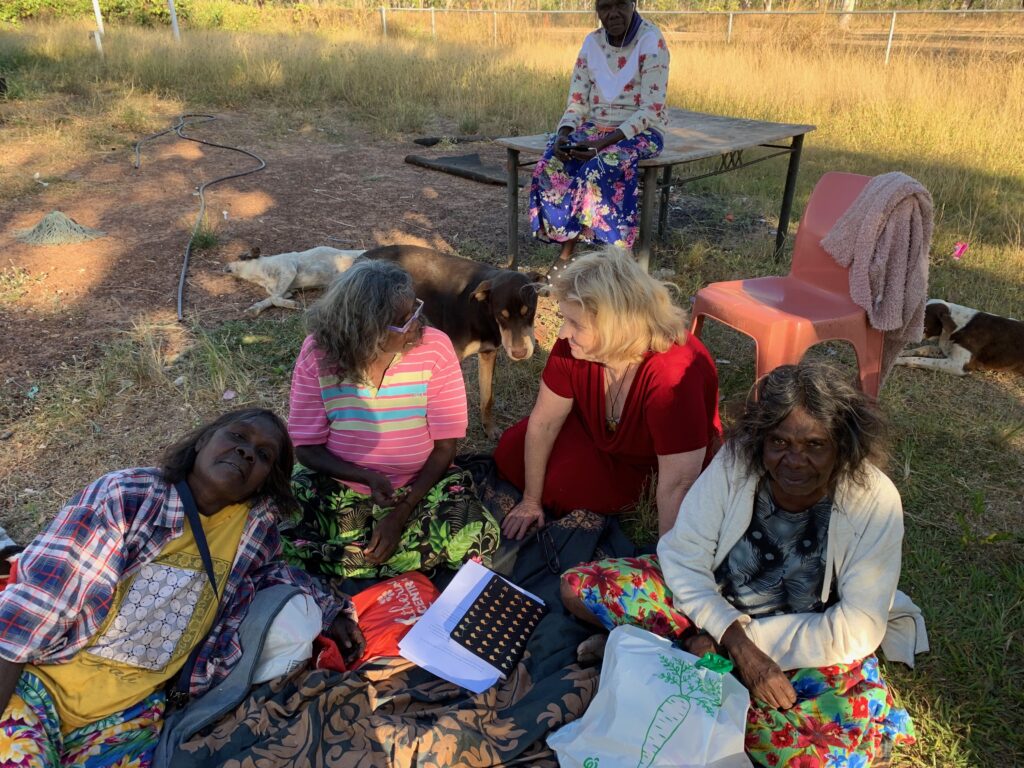Global Initiatives Grant Report – Re-imagining anthropological fieldwork through the lens of COVID-19
Capacity Building
This research addressed fundamental questions for anthropology: does anthropology need to pause when anthropological fieldwork is paused? Could the COVID-19 restrictions prompt a reconceptualization of field-based disciplines? How do we rethink our aims, theories, methods, ethics? Will this lead to different kinds of results?
This research built anthropological capacity in one of the most difficult spaces in Australia: remote Aboriginal communities. This was addressed by building community capacity in anthropological research skills among community researchers. The skills of community researchers were developed through having them interview other members of the community and relaying their findings to me by phone on a daily or bi-daily basis. We discussed the biases and gaps in data collection. This allowed me to track their understandings of COVID-19 and how different members of the community were responding to the restrictions placed upon their movements. We sought to understand the drivers and logic of these adaptations to strengthen the capacity of communities to manage COVID-19 and any future pandemics. We identified three critical cultural barriers to the take-up of health care services by Aboriginal people from remote communities: trust, communication and belief.
Working together, we identified the cultural barriers, enablers and innovations for community adaptation to Covid-19 isolation and health hygiene measures. Community researchers identified the range of baseline knowledge of COVID-19 held by different people in their communities in relation to social and cultural factors such as age, gender, religious affiliation. They identified individual responses to lock-down and community solutions to COVID-19. Finally, they co-developed online materials specific to their communities to increase health literacy of COVID-19. This process is outlined in the articles ‘Voices from the bush – how lockdown affects remote communities differently’, which is an attachment to this report.

Partnerships or Collaborations
This project built on over 30 years of collaborative relationships between Claire Smith and the Barunga, Beswick and Manyallaluk communities. Our research collaboration between Sunrise Health Service Aboriginal Corporation, the Royal Flying Doctor Service and Flinders University was initiated at a workshop at Flinders University in February 2018. This project built on that relationship and responded to community concerns about COVID-19.
Impact/Legacy
We know that this research is informing the work of government education and health care organisations. In April 2024, we agreed to the re-publication of our article ‘Voices from the bush – how lockdown affects remote communities differently in a new book by by Andrew Beaumont, Kim Weston, Fiona Alderson, Lisa O’Halloran Jacaranda Key Concepts in VCE Health & Human Development Units 1 & 2) (for the State of Victoria’s Curriculum Education), which will be published by John Wiley & Sons Australia Ltd., or one of its affiliated companies, as part of official health messaging for Indigenous communities.
Our methodological innovation is to design research that develops and depends on the skills of experienced community researchers for independent data collection and co-analysis. This models a route for ongoing anthropological and field-based research in situations where it is not possible for researchers to physically visit communities. In a field dominated by psychological theories of behaviour change, our reconceptualisation of the role of anthropologists as cultural facilitators is a unique approach that acknowledges the complex interplay of society, history and culture with health and wellbeing. This approach could serve as a model for an anthropology that addresses different kinds of questions as it becomes more finely attuned to the needs of communities. It is the next logical step in a trajectory: research on communities -> research with communities -> research for communities -> research by communities. The development of culturally appropriate tools and strategies will strengthen protection measures against pandemics such as COVID-19 in remote Aboriginal communities. There is potential for our results to be applied elsewhere in Australia and internationally. Our results could provide insights that help remote communities to fight the virus globally.
Sustainability
While our project itself was contained, we sought to expand the research through additional funding. I was awarded $12,000 from the Deputy Vice-Chancellor (Research) at Flinders University. My application for funding for a three-year program from the Special Research Initiatives program of the Australian Research Council was not successful. I also applied for funding from the Australian Research Council’s Linkage Program and from medical funding agencies. The latter were undertaken in partnership with Sunrise Health Service Aboriginal Corporation and Julian Grant, Professor of Nursing at Charles Sturt University. These applications also were unsuccessful. However, the Covid-19 research started me working in a new direction – trying to understand more clearly how Indigenous people might shape archaeology. In collaboration with Dr Kellie Pollard of Charles Darwin University I sought to follow this line of research – and we were successful. In 2022 the Australian Research Council awarded $AUD 1.7 million for the project Indigenist Archaeology: New Ways of Knowing the Past and Present (IN220100079, $AUD 1.7 million), led by Indigenous archaeologist Kellie Pollard and Claire Smith.
The theoretical, methodological and ethical lessons learnt from our Covid-19 research is being sustained within anthropology through publications and conference presentations.
This research contributes to building global capacity in anthropology by recording and analysing cultural understandings of, and responses to, World Health Organization-sanctioned COVID-19 isolation, quarantine and health hygiene measures in the Aboriginal communities in remote parts of Australia. This filled a gap for policy makers and the broader public about the health experiences and cultural attitudes of Indigenous people in remote communities.